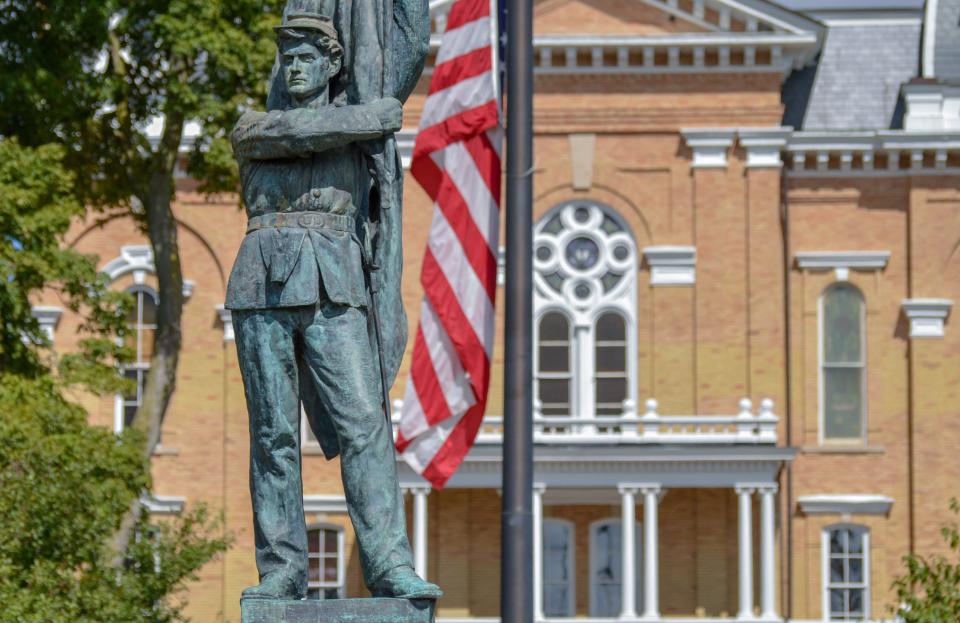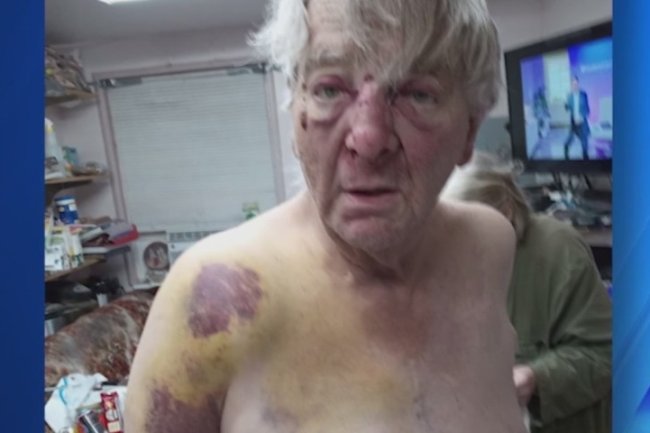Christian Hillsdale College failed students who reported sexual violence, lawsuit alleges
Danielle Villarreal chose to attend Hillsdale College because she thought the Christian school would be safe. Now she's suing.Grace Chen and Danielle Villarreal chose to attend Hillsdale College because they thought the Christian school would be safe. Two years later, they find themselves suing the school, alleging they were raped, and the college failed to help them in the aftermath. They’re now suing the prominent Christian institution in the Western District of Michigan, saying it failed to respond to their attacks and misrepresented how safe they would be. In the lawsuit filed on Wednesday, their attorneys argue the school has, ‘fostered a campus environment that exposes students to an unacceptable and unusually high risk of sexual assault.”At Hillsdale, they have little other recourse because the Michigan campus takes no federal dollars. That exempts it from protocols under Title IX, a gender anti-discrimination law that that is meant to protect students from sexual harassment. I


Grace Chen and Danielle Villarreal chose to attend Hillsdale College because they thought the Christian school would be safe. Two years later, they find themselves suing the school, alleging they were raped, and the college failed to help them in the aftermath.
They’re now suing the prominent Christian institution in the Western District of Michigan, saying it failed to respond to their attacks and misrepresented how safe they would be. In the lawsuit filed on Wednesday, their attorneys argue the school has, ‘fostered a campus environment that exposes students to an unacceptable and unusually high risk of sexual assault.”
At Hillsdale, they have little other recourse because the Michigan campus takes no federal dollars. That exempts it from protocols under Title IX, a gender anti-discrimination law that that is meant to protect students from sexual harassment. It mandates how thousands of colleges respond to such incidents, triggering federal investigations and sanctions if they fall short.
Hillsdale is among a handful of colleges that shun federal money to avoid the government regulations that accompany it.
“To maintain our independence in every regard, Hillsdale does not accept one penny of state or federal taxpayer funding—even indirectly in the form of student grants and loans,” reads a statement on the school’s website.
Chen and Villarreal’s lawsuit, however, maintains that the school does get federal backing through its tax-exempt status as a religious institution. Their case could expand the scope of the federal government’s oversight of not just Hillsdale but others that have taken a similar stance, such as Grove City College in Pennsylvania or Pensacola Christian College in Florida.
Hillsdale didn't immediately return requests for comments from USA TODAY.
If courts accepted widely that tax-exempt status means private institutions are subject to federal regulations, it would “affect every parochial school in the country,” said Brigid A. Harrington, an attorney at Bowditch Attorneys with expertise in Title IX.


“It would be a big change,” Harrington said. “I am not saying this issue would get to the Supreme Court. But if it did, I don’t know how friendly this Supreme Court would be to that idea.”
Harrington said courts might also weigh First Amendment rights. If a school has opted out of receiving federal money to maintain its right to religious speech, Harrington said that would be a strong argument against being subject to Title IX.
Tax-exempt status, however, is only one of the points raised in the suit. It also cites negligence regarding student safety and misrepresentation of campus safety. In California and Maryland, district courts have accepted similar reasoning in cases filed against Christian K-12 schools.
What is Title IX and what does it mean for universities?
Title IX requires that schools provide a clear process to report sexual harassment or assault. It also lays out how investigations must be conducted and defines the rights of the victim and the accused. Chen and Villarreal didn’t know anything about the protections Title IX offers victims of sexual assault. Instead, both said their familiarity with Title IX was limited to what it meant for men’s and women’s sports at some high schools and college campuses.
They said university staff members had mentioned what to do in the case of sexual assault during their freshmen orientation, but the material was sandwiched between other topics.
Part of the initial challenge, they said, was even recognizing that what happened to them was rape. In Chen’s case, the man penetrated her with his fingers, she said, as she attempted to fend him off. Villarreal said she and her attacker had kissed earlier in the night, but she repeatedly said she did not want to have sex because she was a virgin. He penetrated her with his penis anyway, she said.
The women turned to their friends and family for support and guidance. They did not receive similar help, they said, when trying to report their complaints to the school. Villarreal also reported the attack to local police.


Both described a process that was unclear and accusatory. Administrators claimed to believe their stories, they said, but did not follow through with the support the students expected. In Chen’s case, the school hired an outside attorney to review her claims, but she said it did so without her knowledge, sharing her personal information.
That attorney, Chen said, suggested she ought to try to be friends with the attacker in the future.
“I felt very caught off guard,” Chen said. “I’m not going to go home over the summer and just forget about it because you told me to.”
The lawsuit alleges that the school’s general counsel, Bob Norton, at one point suggested that Villarreal, “reported her rape only after she came to regret a consensual sexual encounter.”
Consequences for the attackers they accused felt nonexistent to the young women. Chen, an athlete on the track and field team, had to continue attending a class and practices where she saw the man who raped her. Villarreal was told the athlete who had assaulted her in August 2021 would be suspended from the baseball team “indefinitely,” yet she said he was practicing with the team again by the spring semester.
In the civil suit, Chen and Villarreal are pushing the school to change how it responds to sexual assault on campus and they are asking Hillsdale to pay their legal fees. Because it’s a class action suit, more plaintiffs could join.
Although victims claiming sexual assault often use pseudonyms in court, Chen and Villarreal chose to use their real names, including for this story. Chen said the decision wasn’t easy, but she felt it would make her message more impactful. Villarreal said she wanted to regain control over her life.


“This is my story,” Villarreal said. “And I feel like when I put my name on it I can kind of take back some power and... what I felt like both the school and that guy took from me.”
Chen still attends Hillsdale. Villarreal has transferred to Vanderbilt University, and said her experience reporting the rape played a role in her decision.
What do schools owe their students?
Every year, the government doles out billions in financial aid to help people earn degrees and attend college. The money—in the form of grants and loans—allows students to attend institutions they otherwise couldn’t afford, but it also sustains the higher education landscape.
A handful of colleges argue the federal money comes with too many strings. Hillsdale has declined to take federal funding since the 1980s. Most schools don’t have enough money to try to operate independently of taxpayer money. Those that do, like Hillsdale, typically offer institutional scholarships backed by donor money.
Autonomy allows those schools to adopt policies that could be discriminatory. Hillsdale has come under fire for its stance on LBGTQ’s issues and states on its website, for example, that “sexual activity is understood as belonging between the sexes and in marriage.”
The college does have policies in place to report sexual assault even though they don’t carry Title IX protections said Nancy Chi Cantalupo, a professor of law at Wayne State University. Those policies do come with caveats, she said, including giving the school discretion over which policies may apply to a situation and if action will be taken.
Cantalupo added she would recommend that students avoid going through Hillsdale’s reporting process.
“I wouldn’t advise a student to put themselves in a position where they have so little power,” she said.
Universities that accept federal funding are also required to publish an annual list of crimes that occur on their campus known as the Clery report. Colleges that fail to comply with Clery standards, which also include warning students about potential threats on campus, can face million-dollar fines.
On a webpage about safety on campus, Hillsdale does make available a “security report,” but it’s from 2017. It indicates staff did not log any reports of rape that year.
The new civil suit is one of a recent crop of lawsuits challenging religious schools that claim tax-exempt status but maintain they don’t have to abide by federal regulations. In Maryland, a district judge ruled in 2022 that a Christian high school, Concordia Preparatory School, was subject to Title IX because of its tax-exempt status. That case is now being challenged in the U.S. Court of Appeals for the Fourth Circuit.
Annika Martin, the lead attorney in the lawsuit against Hillsdale, acknowledges the Title IX argument is novel but said the school’s conduct merits scrutiny on other fronts, too. Martin, a partner at Lieff Cabraser's New York office, has brought similar suits against the University of Southern California and the University of Michigan.
“You still have a duty outside of Title IX to protect the safety and well-being of your students,” Martin said. “So even if we weren’t bringing a Title IX claim, you still don’t get to let this happen.”
Chris Quintana is an investigative reporter at USA TODAY. He can be reached at [email protected] or via Signal at 202-308-9021.He is on X at @CQuintanaDC.
This article originally appeared on USA TODAY: What does Christian Hillsdale college owe students who report rape?
What's Your Reaction?













